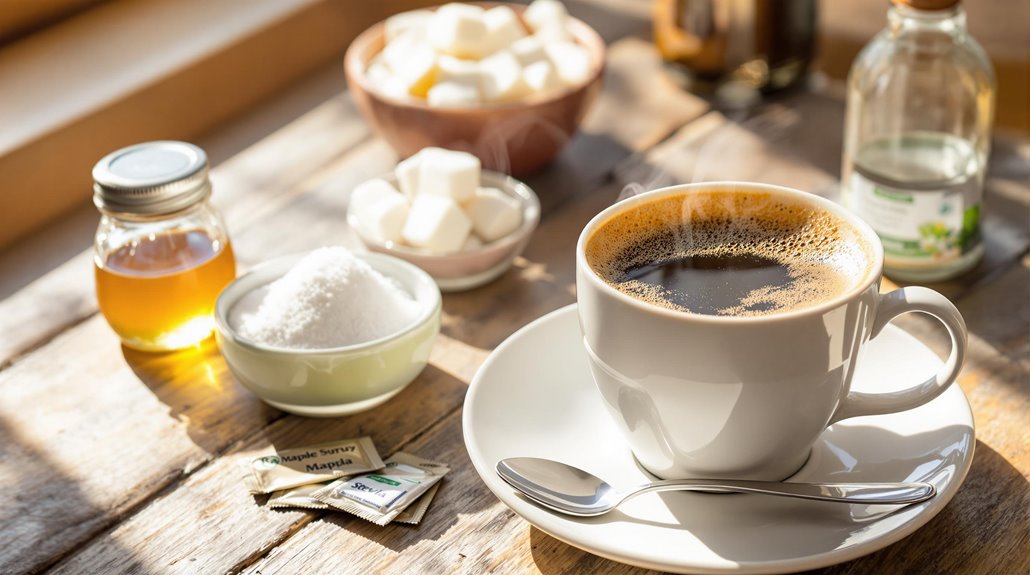







Your morning coffee is a blank canvas, waiting for the perfect brushstroke to transform it. If dairy isn't your go-to, you've got options—each with its own texture, flavor, and quirks. Oat milk might be your creamy companion, while almond milk whispers a nutty note. Pea milk surprises with its protein punch, and soy milk froths like a dream. But which one truly complements your brew without stealing the spotlight? The answer lies in the subtle balance of taste and practicality, and it's closer than you think. What's your ideal match? Let's explore.
Key Takeaways
- Oat milk offers a creamy texture and neutral flavor, making it ideal for lattes and cappuccinos without curdling.
- Pea milk provides high protein content and a smooth, creamy texture, perfect for frothing in coffee beverages.
- Soy milk excels in frothing capabilities and protein content, though it may curdle in acidic or hot coffee.
- Almond milk is a light, low-calorie option with a nutty flavor, but it may curdle in hot or acidic coffee.
- Cashew milk delivers a creamy texture and mild flavor, enhancing coffee while frothing well for latte art.
Oat Milk: Creamy and Neutral Flavor
Oat milk has become a top choice for coffee lovers seeking a creamy, dairy-free alternative. Its creamy texture makes it ideal for lattes and cappuccinos, as it foams well and mimics the mouthfeel of dairy milk. Many brands, like Oatly and Califia Farms, offer barista blends specifically designed for coffee drinks, ensuring they don't curdle when heated. This makes oat milk a reliable option for crafting smooth, professional-quality beverages at home or in cafes.
The neutral flavor of oat milk complements coffee without overpowering it, allowing the natural notes of your brew to shine. Its subtle sweetness, derived from its natural carbohydrate content, enhances the flavor of your coffee without the need for added sugars. This makes it a nutrient-conscious choice for those looking to reduce refined sugar intake.
Compared to whole dairy milk, oat milk is generally lower in calories, offering a lighter yet satisfying option. Its creamy texture and neutral flavor make it versatile for various coffee drinks, from flat whites to iced lattes. If you're seeking a dairy-free alternative that balances health and indulgence, oat milk is a standout choice.
Almond Milk: Light and Nutty Profile
Almond milk offers a light, nutty profile that can subtly enhance your coffee without overwhelming its natural flavors. Its lower calorie content makes it a nutrient-conscious choice for those seeking a lighter alternative to dairy. However, almond milk can curdle in coffee if added to very hot or acidic brews, so it's best to mix it gradually to maintain a smooth texture. Unsweetened varieties provide a delicate, nutty undertone, while sweetened options add a touch of sweetness without masking the coffee's complexity. When it comes to frothing, almond milk performs less effectively than some other alternatives, which may limit its use in lattes or cappuccinos. Despite this, its light consistency and subtle flavor make it a versatile option for everyday coffee drinkers. If you're mindful of its tendency to curdle and its frothing limitations, almond milk can be a satisfying, health-focused addition to your coffee routine. Its nutty essence complements the coffee's natural notes, offering a balanced and enjoyable experience.
Soy Milk: High Protein and Frothable
With its high protein content and excellent frothing capabilities, soy milk stands out as a nutrient-conscious choice for coffee drinkers. Packing around 3-4 grams of protein per serving, soy milk not only supports your daily protein intake but also creates a creamy texture that mimics dairy milk. Its ability to froth makes it a favorite for crafting lattes and cappuccinos, giving your coffee a rich, velvety finish. However, soy milk can curdle when exposed to highly acidic coffee or extreme temperatures, so pour it slowly and guarantee your coffee isn't scalding hot. While its creamy consistency enhances the mouthfeel of your drink, some find its distinct flavor alters the taste of coffee, which may not appeal to everyone. Despite this, soy milk remains a widely accessible and affordable option, available in most coffee shops and grocery stores. If you're looking for a dairy alternative that balances protein, frothing ability, and a creamy texture, soy milk is a reliable choice for elevating your coffee experience.
Coconut Milk: Rich but Thin Texture
Why does coconut milk, despite its rich flavor, often fall short in coffee applications? Its thin texture, a result of its high water content, makes it less effective at retaining flavor in coffee beverages like lattes and cappuccinos. While coconut milk has a neutral taste with a subtle coconut undertone, its watery consistency can dilute the robust flavors of coffee, which may not appeal to those seeking a bolder experience. Additionally, coconut milk struggles to create dense froth, often producing larger bubbles that lack the creamy texture of dairy or other alternative milks. Nutritionally, coconut milk is high in saturated fat, which contributes to its richness but may not align with everyone's dietary preferences. Canned versions also carry potential risks of BPA contamination, raising health concerns. For espresso-based drinks, coconut milk's thin texture often underperforms compared to creamier options like oat or soy milk. While it's a viable option for those who enjoy its unique flavor, coconut milk may not be the best choice for coffee enthusiasts prioritizing texture and froth quality.
Pea Milk: High Protein With Minimal Curdling
Pea milk stands out for its high protein content, offering 6g per serving, which supports muscle repair and satiety while enhancing your coffee experience. Its unique protein structure resists curdling in hot coffee, ensuring a smooth, creamy texture without separation. Additionally, it creates a silky foam, making it a top choice for barista-style drinks like lattes and cappuccinos.
High Protein Content
Boasting 6 grams of protein per serving, pea milk stands out as one of the most protein-rich non-dairy options available. This high protein content not only makes it a nutritious choice but also enhances its functionality in coffee. Unlike many other non-dairy milks, pea milk's protein helps stabilize its structure, ensuring a smooth and creamy texture that blends seamlessly into your cup. Made from nutrient-dense yellow peas, it delivers a neutral flavor profile that won't overpower the taste of your coffee, making it an ideal companion for lattes or cappuccinos. Its creamy consistency mimics traditional dairy milk, offering a satisfying mouthfeel without the need for added thickeners or stabilizers. For those seeking a health-conscious alternative, pea milk is also lower in calories compared to dairy, while still providing a substantial protein boost. Whether you're looking to fuel your morning or simply enjoy a nutrient-dense coffee addition, pea milk's high protein content and creamy texture make it a standout choice among non-dairy milks.
Minimal Curdling Issues
One of the standout advantages of pea milk in coffee is its minimal curdling issues, a common frustration with many non-dairy alternatives. Thanks to its high pea protein content, pea milk maintains excellent emulsification, preventing it from separating when mixed with hot or acidic coffee. This stability makes it a reliable choice for your morning brew, especially if you're using a barista blend designed to handle the heat and acidity of espresso. Unlike some plant-based milks that curdle in coffee, pea milk's creamy consistency holds up well, ensuring a smooth texture without clumping or graininess. Brands like Ripple have even developed barista-specific formulations to enhance performance in coffee drinks, making it a top pick for lattes and cappuccinos. Its neutral flavor also complements coffee without overpowering it, while the added protein supports a nutrient-conscious diet. If you're looking for a plant-based milk that combines health benefits with practical performance, pea milk's minimal curdling issues and creamy consistency make it a standout option.
Silky Foam Quality
For coffee enthusiasts seeking a dairy-free option that delivers a luxurious foam, pea milk stands out with its high protein content and minimal curdling. With 6g of protein per serving, pea milk creates a silky foam that rivals traditional dairy, making it ideal for coffee applications like lattes and cappuccinos. Its protein structure closely mimics dairy, ensuring stable emulsification and excellent frothing capabilities. Brands like Ripple even offer a Barista Style version, specifically formulated to enhance creaminess and prevent curdling, a common issue with other dairy alternatives.
The neutral taste of pea milk complements coffee's natural flavors without overpowering them, while its smooth mouthfeel enhances the overall drinking experience. Unlike some nut milks, pea milk avoids seedy aftertastes, making it a nutrient-conscious choice for those prioritizing both health and flavor. Its versatility extends beyond coffee, fitting seamlessly into various culinary uses while maintaining its creamy texture. If you're looking for a dairy alternative that combines high protein, minimal curdling, and a silky foam, pea milk is a standout option for elevating your coffee routine.
Cashew Milk: Creamy and Mild Taste
Cashew milk's creamy texture enhances your coffee with a smooth, rich mouthfeel, making it a satisfying dairy-free option. Its mild flavor doesn't overpower your brew, allowing the coffee's natural notes to stand out while keeping calories lower than traditional milk. While it steams and froths well, the foam may have larger bubbles, so it's ideal for those prioritizing texture over dense foam in lattes or cappuccinos.
Creamy Texture Benefits
A creamy texture can elevate your coffee experience, and cashew milk delivers just that. As a dairy alternative, cashew milk's rich consistency makes it ideal for creating smooth lattes and cappuccinos. Its natural creaminess comes from healthy fats, which enhance the mouthfeel of your coffee without overpowering its flavor. This makes it a great choice for latte art, as it froths well and blends seamlessly with espresso.
Cashew milk's lower protein content compared to other plant-based options like soy or pea milk reduces the risk of curdling when mixed with hot coffee. This guarantees a consistently smooth beverage, free from the grainy or separated textures that can occur with other alternatives. Additionally, many brands fortify cashew milk with essential vitamins and minerals, such as calcium and vitamin D, offering a nutrient-conscious option for your daily brew.
If you're seeking a dairy-free option that prioritizes texture and complements your coffee's natural flavors, cashew milk's creamy profile makes it a standout choice. Its ability to enhance your coffee's richness while maintaining a smooth consistency guarantees a satisfying sip every time.
Mild Flavor Profile
Beyond its creamy texture, cashew milk's mild flavor makes it a versatile addition to coffee. Its subtle, slightly sweet taste creates a neutral base that complements coffee without overshadowing its natural flavors. This mild flavor profile allows cashew milk to blend seamlessly into lattes, cappuccinos, or even black coffee, making it one of the most adaptable dairy alternatives. Unlike some nut milks, cashew milk doesn't overpower your drink with a strong nutty taste, which is ideal if you prefer a more balanced coffee experience. Additionally, its unsweetened varieties are particularly nutrient-conscious, as they avoid added sugars while still enhancing your beverage. While it contains only about 1g of protein per serving, its rich mouthfeel compensates, providing a satisfying texture. Cashew milk also froths reasonably well, though it may produce slightly larger bubbles compared to dairy milk. For those with soy or almond allergies, it's an inclusive option that doesn't compromise on taste or versatility. If you're seeking a dairy alternative that's both creamy and mild, cashew milk is a standout choice.
Steaming and Foaming Capabilities
Steaming and foaming cashew milk can elevate your coffee experience, offering a creamy texture that mimics dairy without the added calories or allergens. When you steam cashew milk, its natural thickness creates a smooth, velvety mouthfeel, making it an excellent choice for lattes and cappuccinos. While it may not foam as robustly as soy or pea milk due to its lower protein content, it still produces a light, airy froth that complements your coffee beautifully. The mild, slightly sweet flavor of cashew milk enhances your drink without overpowering the coffee's natural notes, ensuring a balanced taste. If you're looking for a dairy alternative that prioritizes texture and subtlety, cashew milk is a nutrient-conscious option. Its ability to steam well and create a lighter foam makes it ideal for those who prefer a less dense froth. Plus, it's free from common allergens, making it a versatile choice for many coffee lovers. Experiment with cashew milk in your coffee routine to enjoy its creamy consistency and health-conscious benefits.
Rice Milk: Sweet and Light Option
Known for its light and subtly sweet flavor, rice milk is a popular dairy-free option that can complement your coffee without overpowering it. Made from milled rice and water, this dairy alternative is naturally nut-free and soy-free, making it a safe choice for those with allergies. However, its lower protein content gives it a thinner consistency, which may not froth as well as other plant-based milks, limiting its use in lattes or cappuccinos. Despite this, rice milk is often fortified with nutrients like calcium and vitamin D, helping bridge the gap between its nutritional profile and that of dairy milk. While its sweet taste can enhance your coffee, be mindful of its higher glycemic index, which may impact blood sugar levels. If you're looking for a light, allergen-friendly option that blends smoothly into your morning brew, rice milk is worth considering, though it may not be ideal for frothy coffee creations.
Hemp Milk: Earthy Flavor With Decent Texture
If you're exploring dairy-free coffee options, hemp milk offers a unique earthy flavor and a creamy texture that can enhance your brew. Made from ground hemp seeds and water, this lactose-free alternative is ideal for those with dietary restrictions, as it's also nut-free and soy-free. While its slightly seedy taste may not appeal to everyone, its creamy texture blends well into coffee beverages, though it doesn't foam as effectively for lattes or cappuccinos. Nutritionally, hemp milk provides around 3 grams of protein per cup, along with essential fatty acids like omega-3 and omega-6, which support heart and brain health. Its earthy flavor pairs best with bold or dark roast coffees, adding depth without overpowering the drink. Additionally, hemp milk is an environmentally sustainable choice, as hemp cultivation requires less water and fewer pesticides compared to other crops. If you're seeking a nutrient-conscious, eco-friendly option with a distinct profile, hemp milk is worth trying in your coffee routine.
Disclosure: As an Amazon Associate, I earn from qualifying purchases.




